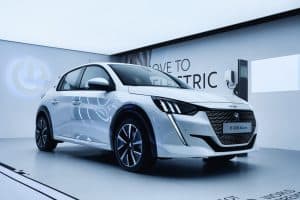
Stellantis NV is considering unprecedented actions to shore up its access to raw materials and vital car parts as soaring energy prices and ongoing supply-chain disruptions threaten the auto industry’s transition to electric vehicles, according to the head of the carmaker’s Citroen brand.
The maker of Jeep and Fiat cars is seeking direct talks with chipmakers, an unusual step in the multi-layered supply chain in carmaking, according to Citroen chief Vincent Cobee. The manufacturer may also go as far as buying battery material providers to ensure reliable supply, he said.
That’s what “we have to do to progressively get out of the storm,” he said in an interview in Paris, where Citroen presented its new Oli concept car this week. “It’s a very nasty discussion but it’s shaking the business model of the auto industry.”
Carmakers are struggling to secure essential parts and materials ranging from lithium for EV batteries to semiconductors for increasingly computerized automobiles. Stellantis is “looking at all options,” Cobee said, adding that the traditional model of using a chain of vendors to procure parts “is starting to crack.”
The supply-chain model for the past “30, 40 years is being put into question by the volatility, the brutality of the crises of the past three years,” Cobee said.
Stellantis is in direct talks with chipmakers about supplies, he added, and is pursuing a range of actions to secure EV battery materials.
“We can secure lithium via a purchase contract, we can be a co-investor into a new mine development, we could buy material providers,” Cobee said.
Meanwhile, Citroen’s concept Oli car is built to showcase a vehicle with fewer energy-consuming features, bucking the trend of making bigger, heavier autos, said Laurence Halsen, product and strategy director at Citroen.
The car, much lighter than comparable vehicles, can be upgraded over time with recycled materials, including cardboard.
“This summer changed everything,” Cobee said in a speech before Oli was unveiled. “We see heatwaves. We see raw materials going up, we see inflation coming, we see energy concerns. The world is not infinite in its resources. We need to address that.”
